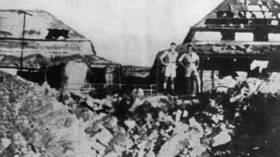The deadly anniversary that reminds a nation of its vulnerability

The Second World War was undoubtedly the first war of the skies. When one thinks of the aerial conflict, the Battle of Britain, the carpet bombing of German cities, the attacks on Gorky, V1 and V2 rockets, Pearl Harbour, and the atomic bombs all spring to mind. Yet February 19 marks the 80th anniversary of one of the lesser known aerial attacks of the war: the bombing of Darwin.
Most people outside Australia are not aware that the Australian mainland was the subject of a deadly air raid. On the morning of February 19 1942, 188 Japanese planes attacked Darwin, killing 235 people and injuring more than 400. Indeed, 30 allied aircraft were destroyed, and 11 ships were sunk. More bombs were dropped on Darwin that day than fell on Pearl Harbour in December 1941.
The attack on Darwin also marked the beginning of a wider aerial campaign against northern Australia. There were a further 63 attacks, although none was as large or as devastating as the bombing of Darwin. The Japanese were able to attack because they had gained control of much of New Guinea, which is only 80 nautical miles (150km) from Australia’s northernmost tip.
Although the Japanese never had any serious intention of invading Australia, mainly due to its size, the government and public thought it a distinct possibility. Indeed, the threat of a Japanese invasion seemed so real that the Australians decided to return their forces from the Mediterranean theatre, much to the anger of British PM Winston Churchill, who wanted them sent instead to Burma to protect British India.
The bombing of Darwin and the fear of a Japanese invasion also finally convinced the Australians that they could no longer rely on the British Empire for protection. Britain’s resources by this point were already stretched to the limit, with its cities ravaged by German bombs, as well as fighting Axis forces in North Africa, and Japanese in the Far East. As a result, Australia turned to the United States for protection.
US troops began arriving in Australia in early 1942, and during the war more than one million would pass through the country. Relations between Australia and the US became ever more cordial, and Britain was supplanted as its principal defender. The ties to the ‘Mother Country’ were loosened and Canberra now looked to Washington, rather than London, for aid. The bombing of Darwin therefore had geopolitical consequences and was a nail in the coffin of the British Empire and British influence in the region.
The attack on Darwin, and the fear of Japanese invasion, has also been burned into the Australian psyche and its effects can still be felt today. The only difference is that wariness of Japan has been replaced by concerns over another East Asian powerhouse, China. Now, I am not suggesting for one moment that China is going to attack Australia like the Japanese did, because clearly it won’t. But China’s potential economic and military domination of the region is very real.
Since the turn of the century, China has been making serious economic inroads in the South Pacific. Indeed, since the millennium there has been a 12-fold increase in Chinese trade in the region. A number of the islands, which are the first on the planet to see the sunrise each day, are increasingly aligning themselves with China. Moreover, 30% of New Zealand’s exports now go to China and the two countries recently announced that they have upgraded their 2009 Free Trade Agreement.
New Zealand’s relative closeness to China is looked upon with suspicion and is seen by some as a threat to the Five Eyes intelligence-gathering program. Although New Zealand’s PM Jacinda Ardern has acknowledged that there are issues around which the two countries “do not, cannot, and will not agree,” she has argued that the differences should not define her country’s relationship with China
Whereas New Zealand has been prepared to deal with China, the Australian government has started to take a more hostile stance. In recent years, Australia has been ‘decoupling’ from Chinese economic reliance and has torn up prospective investments in its infrastructure. Australia clearly views Chinese influence in the region with suspicion, and even though China remains Australia’s largest trading partner, the two countries are involved in a protracted trade war.
The distrust, however, is not only confined to trade, as there are also military concerns – primarily over the rapid expansion of China’s navy. Between 2015 and 2019, China built 132 new vessels, compared to the US’ 68 and Australia’s nine. China also has an estimated 40 attack submarines, of which six are nuclear-powered. By comparison, the US has 21 based in the Pacific and Australia only six relatively obsolete 1990s Swedish-made submarines.
The balance of power in the Pacific is on a knife-edge, and this goes some way to explaining why Australia ditched an agreement with France to purchase 12 diesel-powered submarines in favour of US built nuclear-powered alternatives. The controversial deal, known as AUKUS, as it also includes the UK, is clearly designed to counter growing Chinese military strength in the region. Moreover, earlier this week a new £25 million security package was signed between Australia and the UK to “strengthen resilience in cyberspace, state threats and maritime security.”
The perceived threat of China has also seeped into political discourse in Australia, and it will be a major issue in the run up to May’s federal election. For example, last week, Prime Minister Scott Morrison accused the deputy leader of the Labor Party, Richard Marles, of being a “Manchurian Candidate.” The basis of this was that Marles had previously spoken of his respect for China when visiting Beijing in 2019. I think it is fair to assume that claims and counter-claims of this nature will be common as the election approaches.
Although the bombing of Darwin is relatively unknown outside Australia, it has had a profound effect on the world we live in today. And for that reason, it deserves to be both remembered and more widely acknowledged. It signalled the collapse of British influence in the South Pacific and its replacement by the US as the dominant power. The scars of Darwin are also etched into the Australian psyche, and it could be argued that the country’s attitude towards China is an extension of what happened eighty years ago today.
The statements, views and opinions expressed in this column are solely those of the author and do not necessarily represent those of RT.















